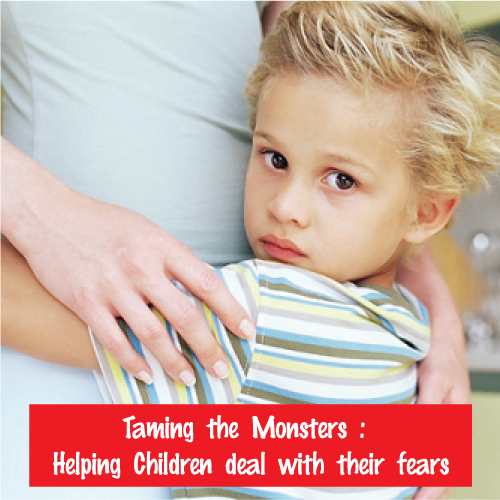Taming the Monsters : Helping Children Deal with Their Fears
Most of us had an all-consuming fear of something or even someone as children, which we either kept a secret for the fear of being made fun of, or exposed ourselves by overreacting when faced with our secret phobia unexpectedly. Needless to say, we earned ourselves a lifetime of ridicule, apart from being the subject of pranks, and the butt of jokes.
The phobia could be as simple as a fear of cockroaches or as sinister as that of ghosts and demons. Most children somehow come to believe those evil characters lurk under their beds, waiting for the right opportunity to pounce on them. Elders, in their bid to discipline children, sometimes play a role unwittingly in implanting some of the fears in young minds.
As we grow older, we learn to differentiate facts from fiction. We are no longer afraid, or at least not to the same degree, as we were of nightly visitors and imaginary foes. But, some people never quite manage to overcome their phobia of insects and other creepy-crawlies even as adults.
 Usually, childhood fears and anxieties are not very serious in nature. But intervention becomes necessary if it affects children’s normal lifestyle. Children undergo different kind of anxieties at various stages in their life. Let us examine the phobias, and worries children endure growing up.
Usually, childhood fears and anxieties are not very serious in nature. But intervention becomes necessary if it affects children’s normal lifestyle. Children undergo different kind of anxieties at various stages in their life. Let us examine the phobias, and worries children endure growing up.
- Babies under the age of 1: Separation anxiety grips most children when they are left alone in a room for a moment or a stranger (to the baby) tries to hold them.
- Toddlers and preschoolers: Anxieties at this age include fear of shadows, dark corners, loud and unexpected noises. They are also bothered by occasional nightmares.
- School-going children: Older children’s fears are based on reality or something they came across in a TV show or a book, or worse, the state of their parents’ relationship.
What are the tell-tale signs of a child troubled by fears? It can manifest itself in various ways. Older children are reticent about their fears and may not always be forthcoming, either because they do not fully understand the situation or fear being ridiculed or made fun of. Look out for signs like thumb sucking, nail chewing, trembling, and being edgy and jumpy.
Here’s what parents can do to reassure the child:
- Ask your kid what is bothering them. Follow it up with logical explanations. For example, explain to them that the loud noise they heard the previous night was a tyre bursting. And tell them it is a rare occurrence and the rider was unhurt.
- Don’t force your child to confront a fear. Nor belittle them for being fearful.
- Never argue or fight in their presence and also be careful about what you say.
- Hug them and stay close to them when they are distressed to reassure them of your support and concern for their well being.
- Let them know that you are always in full control of any situation and they have nothing to worry about.
Disclaimer:
The aim of the article is to be informative in a general way. Always seek expert medical advice.